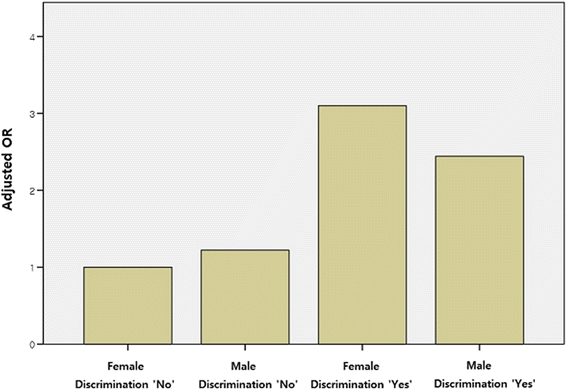The association of relational and organizational job stress factors with sleep disorder: analysis of the 3rd Korean working conditions survey (2011)
- PMID: 27625788
- PMCID: PMC5020473
- DOI: 10.1186/s40557-016-0131-2
The association of relational and organizational job stress factors with sleep disorder: analysis of the 3rd Korean working conditions survey (2011)
Abstract
Background: Sleep disorder is a disease that causes reduction in quality of life and work efficiency of workers. This study was performed to investigate the relationship between job-related stress factor and sleep disorder among wageworkers in Korea.
Methods: This study was based on analysis of the 3rd Korean working conditions survey. We analyzed 35,902 workers whose employment status is wageworker. We classified the job-related stress factor into 12 sections. Logistic regression was performed to estimate the relationship between job-related stress factor and sleep disorder and Odds ratio and 95 % CI were calculated using the SPSS version 23.0 program.
Results: Many categories of Job-related stress factor were correlated with sleep disorder (8 of 12 for women, 10 of 12 for men). The results of the regression analysis, corrected for general and occupational characteristics, indicated that sleep disorder was significantly correlated with the following categories of job-related stress: discrimination experience (OR 3.37, 95 % CI = 2.49 ~ 4.56 in women, OR 1.96, 95 % CI = 1.53 ~ 2.51 in men), direct customer confrontation (OR 2.72, 95 % CI = 1.91 ~ 3.86 in women, OR 1.99, 95 % CI = 1.45 ~ 2.72 in men), emotional stress (OR 2.01, 95 % CI = 1.30 ~ 3.09 in men), work dissatisfaction (detailed) (OR 1.99, 95 % CI = 1.36 ~ 2.93 in men), work dissatisfaction (overall) (OR 2.30, 95 % CI = 1.66 ~ 3.20 in women, OR 2.40, 95 % CI = 1.88 ~ 3.08 in men), expression of opinion difficulty (OR 0.66, 95 % CI = 0.48 ~ 0.92 in women, OR 0.57, 95 % CI = 0.45 ~ 0.73 in men).
Conclusion: A number of studies have reported that stress affects sleep disorder. In this study, many factors suspected to increase the risk of sleep disorder were added to previously known job stress factors. In particular, this study found a strong correlation between work-associated sleep disorder and relational and organizational job stress factors. Sleep disorder may lead to large decreases in workers' quality of life and work efficiency. Awareness and interventions are therefore required to reduce workplace stress; additional research of this topic is also required.
Keywords: Job-related stress factor; KWCS; Sleep disorder.
Figures

Similar articles
-
The relationship between depressive symptoms among female workers and job stress and sleep quality.Ann Occup Environ Med. 2013 Jul 22;25(1):12. doi: 10.1186/2052-4374-25-12. Ann Occup Environ Med. 2013. PMID: 24472381 Free PMC article.
-
Anxiety symptoms and occupational stress among young Korean female manufacturing workers.Ann Occup Environ Med. 2015 Nov 14;27:24. doi: 10.1186/s40557-015-0075-y. eCollection 2015. Ann Occup Environ Med. 2015. PMID: 26568830 Free PMC article.
-
Association between Workplace Risk Factor Exposure and Sleep Disturbance: Analysis of the 2nd Korean Working Conditions Survey.Ann Occup Environ Med. 2013 Dec 27;25(1):41. doi: 10.1186/2052-4374-25-41. Ann Occup Environ Med. 2013. PMID: 24472113 Free PMC article.
-
Association between supervisors' behavior and wage workers' job stress in Korea: analysis of the fourth Korean working conditions survey.Ann Occup Environ Med. 2017 Oct 11;29:43. doi: 10.1186/s40557-017-0199-3. eCollection 2017. Ann Occup Environ Med. 2017. PMID: 29046811 Free PMC article.
-
Work hazards and workers' mental health: an investigation based on the fifth European Working Conditions Survey.Med Lav. 2019 Apr 19;110(2):115-129. doi: 10.23749/mdl.v110i2.7640. Med Lav. 2019. PMID: 30990473 Free PMC article. Review.
Cited by
-
Influence of Work Characteristics on the Association Between Police Stress and Sleep Quality.Saf Health Work. 2019 Mar;10(1):30-38. doi: 10.1016/j.shaw.2018.07.004. Epub 2018 Jul 29. Saf Health Work. 2019. PMID: 30949378 Free PMC article.
-
Association between sleep quality and type of shift work in Korean firefighters.Ann Occup Environ Med. 2022 Oct 11;34:e27. doi: 10.35371/aoem.2022.34.e27. eCollection 2022. Ann Occup Environ Med. 2022. PMID: 36452253 Free PMC article.
-
Disability and Economic Loss Caused by Headache among Information Technology Workers in Korea.J Clin Neurol. 2021 Oct;17(4):546-557. doi: 10.3988/jcn.2021.17.4.546. J Clin Neurol. 2021. PMID: 34595863 Free PMC article.
-
Association of discrimination and presenteeism with cardiovascular disease: the Fourth Korean Working Conditions Survey.Ann Occup Environ Med. 2019 Oct 11;31:e28. doi: 10.35371/aoem.2019.31.e28. eCollection 2019. Ann Occup Environ Med. 2019. PMID: 31737283 Free PMC article.
-
Association between high emotional demand at work, burnout symptoms, and sleep disturbance among Korean workers: a cross-sectional mediation analysis.Sci Rep. 2023 Oct 4;13(1):16688. doi: 10.1038/s41598-023-43451-w. Sci Rep. 2023. PMID: 37794088 Free PMC article.
References
-
- Ham JO, Kyu Yoon H, Kyu Dong A, Byung Kook L, Nam TS. A study on the status of working environment control and health management of workers in a manufacturing industries. Korean J Prev Med. 1990;23:275–84.
-
- Lee HJ. Overwork-related Mental Illnesses, Suicide and Occupational Accidents. Korean J Indus Relat. 2011;21:133–56.
-
- Sun-Hee J, Jong P. Effect of Life Stress on the Sleeping Disorder of University Student. Korea Inst Electron Commun Sci. 2013;8:345–53. doi: 10.13067/JKIECS.2013.8.2.345. - DOI
-
- Nakata A, Haratani T, Takahashi M, Kawakami N, Arito H, Fujioka Y, et al. Job stress, social support at work, and insomnia in Japanese shift workers. J Hum Ergol. 2001;30(1–2):203–9. - PubMed
LinkOut - more resources
Full Text Sources
Other Literature Sources

